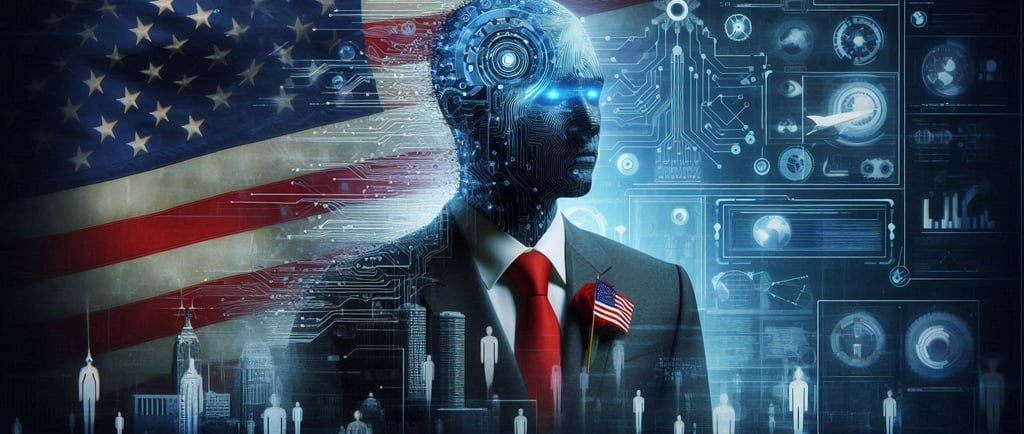The Future of AI Under Trump's Leadership: Innovations and Controversies
In one of his first actions as president, Donald Trump revoked a sweeping executive order from the Biden era that sought to implement safeguards on artificial intelligence. This move signaled Trump's intention to put his own stamp on how the United States should adopt and develop this fast-moving, critical technology. It also hinted that AI would be a significant theme in Trump's second term.
POLICY
The AI Maker
3/14/20253 min read


In one of his first actions as president, Donald Trump revoked a sweeping executive order from the Biden era that sought to implement safeguards on artificial intelligence. This move signaled Trump's intention to put his own stamp on how the United States should adopt and develop this fast-moving, critical technology. It also hinted that AI would be a significant theme in Trump's second term.
So far, this has materialized in public displays of US computing power, such as Stargate, the new $500 billion AI company led by a supergroup of Silicon Valley bigwigs. However, it has also resulted in controversies that raise questions about the ethics of how AI should be used and regulated.
The latest development came on Monday when Apple announced its investment of more than $500 billion to expand its footprint in the United States, including opening a new Texas facility to build servers for its suite of artificial intelligence features. While AI might seem like a small part of this announcement, it represents a commitment by Apple to root what is expected to be a core part of its products in the United States.
Despite the president's claims to the contrary, Apple's expansion likely has little to do with Trump's influence. This is not the first time the iPhone maker has committed to investing billions to expand in the United States and create new jobs. Plus, the investment aligns with what a company of Apple's size is expected to spend based on its revenue. Nevertheless, it is happening in a political and economic climate that Trump is steering – one where AI is already shaping up to be a significant part.
Trump kicked off his term with the announcement of Stargate on January 21, just one day after his inauguration. The massive new AI infrastructure company, led by OpenAI CEO Sam Altman, Softbank CEO Masayoshi Son, and Oracle Chairman Larry Ellison, aims to build “the physical and virtual infrastructure to power the next generation of AI”. Altman called it “the most important project of this era”.
In his first international appearance as vice president, JD Vance spoke at the Artificial Intelligence Action Summit in Paris earlier this month to reiterate the United States' position on AI and attempt to assert its dominance in the field. “The United States of America is the leader in AI, and our administration plans to keep it that way,” he said.
These comments came after Chinese startup DeepSeek shook Wall Street and Silicon Valley with its high-performing yet supposedly cheap AI model, escalating the ongoing tech rivalry between the United States and China. However, some of the Trump administration's views on AI have been controversial, both in terms of regulation – or a lack thereof – and how AI is being used. Aside from revoking Biden's executive order, Vance also said that “excessive regulation of the AI sector” could “kill a transformative industry just as it’s taking off” during the AI summit in Paris.
Elon Musk's Department of Government Efficiency (DOGE) is reportedly planning to use AI to evaluate cost reductions, following thousands of layoffs across the federal government. Trump's decision to revoke Biden's executive order and questions about how and if AI should be used within the government are likely just the start of many choices the administration will have to make about the future of AI.
This includes whether to uphold another Biden-era policy that aims to prevent sophisticated AI from falling into the wrong hands by imposing controls on certain computing chips and AI models. Critics of the policy, such as Microsoft President Brad Smith and Nvidia's vice president of government affairs, Ned Finkle, argue that it could jeopardize America's position in the global AI race. In a February 27 blog post, Smith said the restrictions could push countries facing restrictions to turn to other resources instead, including China. “If left unchanged, the Diffusion Rule will become a gift to China’s rapidly expanding AI sector,” he wrote.
The bigger focus on AI, from both the government and Silicon Valley, isn't new and is part of a trajectory that’s been years in the making. It’s more about a shift in how people are using technology and the internet and less about Trump's specific decisions and policies. However, the tech companies largely responsible for that shift are now subject to Trump's policies. Trump happens to be president during what could be the biggest tech transformation since the smartphone.
Before OpenAI's ChatGPT arrived in 2022, AI was considered a critical but largely behind-the-scenes technology that helped tech gadgets and services function. OpenAI's service helped popularize the idea of using an AI-driven chatbot to fulfill some of the duties of Google’s search engine and more, reshaping the internet and the myriad services that connect to it. It’s a future that the Trump administration wants the United States to be at the center of – just as it was for the smartphone boom largely driven by Apple and Google more than a decade ago.
Cited: https://www.cnn.com/2025/02/28/tech/trump-ai-apple-investment-stargate-deepseek/index.html
Your Data, Your Insights
Unlock the power of your data effortlessly. Update it continuously. Automatically.
Answers
Sign up NOW
info at aimaker.com
© 2024. All rights reserved. Terms and Conditions | Privacy Policy
